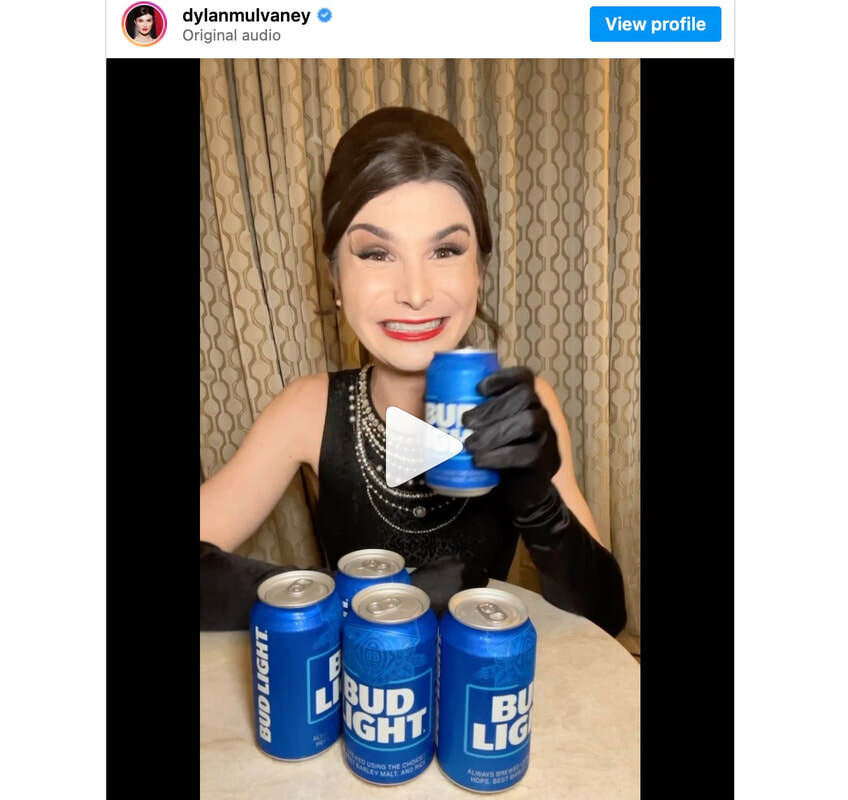
The incident highlights what a divided and polarized country the U.S. has become today, and how angry customers are seizing power.
The facts are now well known. The American beer brand Bud Light was caught in a social storm at the beginning of April because it had engaged the well-known transgender influencer Dylan Mulvaney for some commercials. As an influencer and activist, Mulvaney is also a familiar face outside of social media. She has been acting since 2015 and announced during the pandemic that she is a transgender woman. Since the beginning of last year, she has been scoring on TikTok with videos of her transition. Bud Light enlisted her for some sponsored videos in the spring, and also sent her a can with her face on the occasion of her first birthday as a woman.
As a result, the brand found itself in the firing line of right-wing conservative forces in the US who openly called for a boycott of their favorite brand, and not without success. The parent company AB InBev is said to have already lost 20 billion dollars in market capitalization, and sales have also plummeted by more than a quarter. Although at the moment the low point seems to have been reached.
Paradoxically, Bud Light has been supporting the LGBT+ movement in the US for over 20 years, without giving rise to any significant controversy. The campaign with Dylan Mulvaney seemed like a logical next step. Not so. The incident exposes some tendencies, beyond the controversy surrounding Bud Ligth, that are also relevant to other brands.
- The relationships between brands and their customers have been shifting for some time. 15 years ago I wrote in my book "Het merk mens" (LannooCampus) that consumers seize power. The real owners of a brand are not the marketing managers, the management or the shareholders, but the customers of the brand. It may have seemed like a distant mirage to many at the time. Today, the boycott of Bud Light by its customers shows that the balance of power has indeed shifted. A marketing manager doesn't have a free pass to do what he or she wants with a brand. The customer ultimately has the final say. It is the customer who decides.
- The context in which a brand operates has changed today. After Trump's election defeat, and in the run-up to next year's presidential election, the US is more than ever a divided country. The Divided States instead of the United States, so to speak. This division is not a new phenomenon, but today it is not merely leading to verbal polarization on social and other media, but is increasingly giving rise to forms of physical violence, including the economic boycott of brands by right-wing conservative forces.
- In recent years, many brands have increasingly emerged as real social activists on themes such as racism, diversity, gender equality, global warming. Brands today have become political actors, willingly or unwillingly. For some brands, that's part of their culture and their DNA. Think Nike, Ben & Jerry or Patagonia. Other brands, including Procter & Gamble, Unilever and AB InBev with Bud Light, have followed suit in this movement. Sometimes successfully, but in other cases they have also alienated themselves from their classic, historical constituency. That's what happened to Bud Light this year. The more brands, and their CEOs, move away from their brand's roots, the more risk they run of being misunderstood, or even boycotted by their traditional constituencies. "Should a mayonnaise already have a purpose, or should it just be good mayonnaise", a critical shareholder of Unilever wondered earlier. Trust comes on foot, but goes on horseback, says the proverb. It's what Bud Light has experienced firsthand.
- When a company draws up a strategy for a brand, it must also consistently adhere to it. This applies to a commercial positioning, but also to a social commitment. To repair the damage, Bud Light has launched a new campaign in which it reconnects with the familiar American patriotism and cultural heritage. Whether that is credible remains to be seen. In any case, the ambiguous attitude has caused the LGBT+ community in the US to be left disillusioned and not understand why the brand folds so quickly under social pressure.
"Can something like this happen to us?", VRT journalist Kerlijne Everaet asked me this week in her program "De Markt". We don't live here in the US yet, but here too the social polarization, especially around "woke", is continuing. For the time being, this is not accompanied by the boycott of committed brands. Thank goodness. But what is not, may yet come. Brands have a social role to play that goes beyond creating growth, providing employment and satisfying their shareholders. Consumers also ask us that brands take their responsibility, including in the fight against global warming. But in order to remain credible, the commitment must be deeply embedded in the vision and mission of the company. And possible headwinds must also be taken into account. The customer has the power, indeed.
Written by BBDO Belgium Team, We create effectiveness